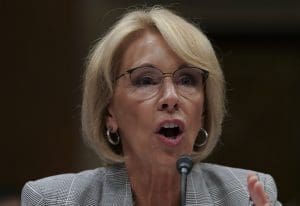DeVos wants to use relief funds for private schools at the expense of kids in need
Education Secretary Betsy DeVos’ attack on public schools ‘could significantly harm’ low-income students, according to state school superintendents.

Education Secretary Betsy DeVos has launched another attack on vulnerable students. On April 30, the Education Department issued guidance to states that would allow them to use coronavirus relief intended for schools serving low-income students to give to wealthy private schools, Chalkbeat reported on Tuesday
In the guidance, the Education Department cited the “significantly broader eligibility” requirements for schools provided in the CARES Act, changing the formula normally used to distribute Title I funds. Those funds are intended to support students from low-income families.
As a result of the change, significantly less funding could go to schools serving students in high-poverty neighborhoods, while more will go to wealthy private schools serving fewer lower-income students, according to Chalkbeat.
For example, private schools in Louisiana will receive $31 million from the CARES Act, more than three times as much funding as they would have received if DeVos had not changed the formula. The additional funding comes directly from schools that serve more low-income students, according to Chalkbeat.
The guidance allows “wealthy children in private school — ineligible for Title I — to receive CARES funding that was allocated to districts based on the low-income students they serve,” Noelle Ellerson Ng, associate executive director of AASA, the School Superintendents Association, told Chalkbeat. “That is inequitable.”
The guidance runs counter to language in the CARES Act, which directs the department to issue the $13 billion in relief funds “in the same manner” as Title I funds, according to a letter from the Council of Chief State School Officers.
The altered funding formula “could significantly harm the vulnerable students who were intended to benefit the most from the critical federal COVID-19 education relief funds Congress has provided,” according to group, which represents the top education officials of every state. It has asked DeVos to go back to the original formula to “ensure that disadvantaged students receive the critical relief Congress intended.”
This incident is not the first time DeVos has used the coronavirus crisis to attack vulnerable students.
In April, DeVos blocked DACA recipients from receiving any of the $6 billion in aid passed by Congress meant to help college students deal with hardships as a result of the coronavirus crisis.
Democrats in Congress criticized the action, saying the decision “unnecessarily harms students in need” and “contradicts clear Congressional intent and the plain language of the CARES Act.”
On April 30, a New York woman filed a lawsuit alleging the Education Department garnished her April wages for defaulting on a student loan. This followed an announcement from Devos in mid-March that the department would not garnish wages for student loan defaults during the coronavirus crisis. The CARES Act enshrined that protection in law until Sept. 30, 2020.
Published with permission of The American Independent Foundation.
Recommended

Alaska House committee advances, expands proposal to bar trans girls from girls sports
Amended bill would add elementary, middle school and collegiate sports to limits in place for high school
By Claire Stremple, Alaska Beacon - April 16, 2024
Senate clears gallery, passes bill to arm Tennessee teachers
Covenant parents emotional in wake of vote
By Sam Stockard, Tennessee Lookout - April 10, 2024
Not if, but when: Parents of slain Parkland students urge Utah lawmakers to pass school safety bill
The parents of children killed in the 2018 Marjory Stoneman Douglas High School shooting have a stark warning for Utah lawmakers: “It’s not a matter of if, it’s a matter of when and where the next school shooting will happen.”
By Kyle Dunphey, Utah News Dispatch - February 21, 2024

















































































